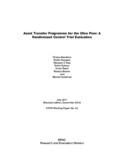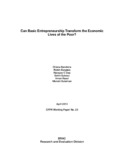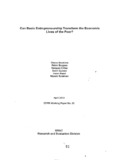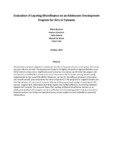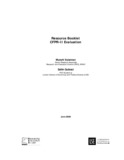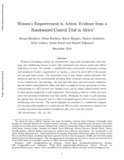Browsing by Author "Gulesci, Selim"
Now showing items 1-10 of 10
-
Asset transfer programme for the ultra poor: A randomized control trial evaluation
Bandiera, Oriana; Burgess, Robin; Das, Narayan C; Gulesci, Selim; Rasul, Imran; Shams, Raniya; Sulaiman, Munshi (BRAC Research and Evaluation Division, 2012-12)The world’s poorest people lack both capital and skills and are trapped in low return occupations. However, whether their economic lives can be transformed by programs which attempt to tackle both constraints by providing ... -
Can basic entrepreneurship transform the economic lives of the poor?
Bandiera, Oriana; Burgess, Robin; Das, Narayan C; Gulesci, Selim; Rasul, Imran; Sulaiman, Munshi (BRAC Research and Evaluation Division, 2013-04)Does the lack of capital and skills drive occupational choice and poverty? We provide evidence from a large scale and long term Randomized Control Trial of a program that simultaneously provides assets and training to the ... -
Can basic entrepreneurship transform the economic lives of the poor?
Bandiera, Oriana; Burgess, Robin; Das, Narayan C; Gulesci, Selim; Rasul, Imran; Sulaiman, Munshi (BRAC, 2013-04)Does the lack of capital and skills drive occupational choice and poverty? We provide evidence from a large scale and long term randomized control trial of a programme that simultaneously provides assets and training to ... -
Evaluation of layering microfinance on an adolescent development program for girls in Tanzania
Buehren, Niklas; Goldstein, Markus; Gulesci, Selim; Sulaiman, Munshi; Yam, Venus (2015-10)The paper evaluates a program targeted towards adolescent women in Tanzania and aims to empower them both economically and socially. The program was found to be highly successful in Uganda in terms of economic, health and ... -
Intentions to participate in adolescent training programs: Evidence from Uganda
Bandiera, Oriana; Goldstein, Markus; Rasul, Imran; Burgess, Robin; Gulesci, Selim; Sulaiman, Munshi (Oxford Academic, 2010-05-01)Almost one-third of the population in developing countries is under age 15. Hence improving the effectiveness of policy interventions that target adolescents might be especially important. We analyze the intention to ... -
Labor markets and poverty in village Economies
Bandiera, Oriana; Burgess, Robin; Das, Narayan Chandra; Gulesci, Selim; Rasul, Imran; Sulaiman, Munshi (Oxford Academic, 2017-03-20)We study how women's choices over labor activities in village economies correlate with poverty and whether enabling the poorest women to take on the activities of their richer counterparts can set them on a sustainable ... -
Moral hazard: Experimental evidence from tenancy contracts
Burchardi, Konrad B; Gulesci, Selim; Lerva, Benedetta; Sulaiman, Munshi (Oxford Academic, 2018)Agricultural productivity is particularly low in developing countries. Output-sharing rules that make farmers less-than-full residual claimants are seen as a potentially important driver of low agricultural productivity. ... -
Resource Booklet CFPR-II Evaluation
Sulaiman, Munshi; Gulesci, Selim (BRAC Research and Evaluation Division and London School of Economics and Political Science (LSE), 2008-06)Challenging the Frontiers of Poverty Reduction (CFPR) is one of the relatively recent additions to BRAC’s long experience with development approaches. This experimental program was launched in 2002 with a complete package ... -
A stepping stone approach to understanding harmful norms
Gulesci, Selim; Jindani, Sam; Ferrara, Eliana La; Smerdon, David; Sulaiman, Munshi; Young, Peyton (Centre for Economic Policy Research (CEPR), 2021-02)Harmful social norms often persist despite legal and economic sanctions against them. Can the abandonment of a harmful norm be facilitated by the presence of a 'mildly harmful' alternative that may act as a stepping stone ... -
Women’s empowerment in action: Evidence from a randomized control trial in Africa
Bandiera, Oriana; Buehren, Niklas; Burgess, Robin; Goldstein, Markus; Gulesci, Selim; Rasul, Imran; Sulaiman, Munshi (World Bank, 2018-12)Women in developing countries are disempowered relative to their contemporaries in developed countries. High youth unemployment and early marriage and childbearing interact to limit human capital investment and enforce ...

